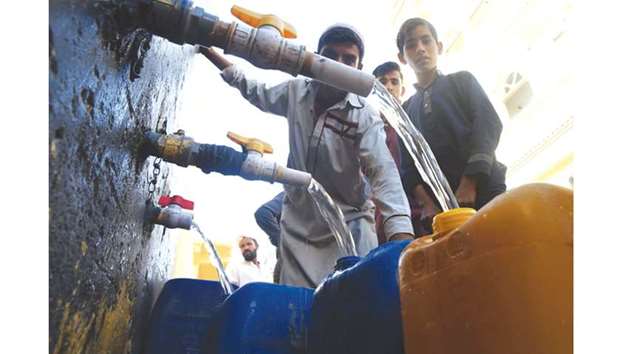A meeting on solid waste management and water stocktaking presided by Minister Mashhood Ahmad approved the scheme, official sources said yesterday.
In rural Punjab, before scaling the Clean Punjab strategy province-wide, a pilot, in partnership with Unicef, was completed in Bahawalpur, Okara and Kasur districts.
The success in pilot districts like Kasur prompted the chief minister and the Punjab government to launch the “Khadim-e-Punjab Saaf Dehat Programme” on a wider scale.
In the stocktaking meeting on clean water, it was discussed that the Punjab launched clean water roadmap in 2015 for improving water quality and ensuring the province’s 110mn citizens had access to clean and safe drinking water.
A number of initiatives were taken, including construction of 116 water filtration plants in Bahawalpur by the Saaf Pani Company, which are now serving 350,000 people.
Two phases of community mobilisation campaigns have been carried out which have increased utilisation (from 44% to 75%) of these plants.
The government has also rehabilitated 274 dysfunctional rural water schemes at a cost of Rs730mn which has benefited 1.3mn people in the province.
During the meeting, it was discussed how the clean water roadmap had put in place a monitoring system to collect data on water quality.
Technological interventions such as Geo-tagging and monitoring dashboards have been developed and are being leveraged to ensure that accurate and reliable data is generated for effective monitoring.
The achievements in the Clean Punjab Roadmap were also discussed.
In the urban sector, waste collection is carried out through seven WMCs (waste management companies): in Lahore, Rawalpindi, Gujranwala, Sialkot, Faisalabad, Multan, and Bahawalpur.
Operations of all the seven WMCs are planned to be outsourced to private international contractors to improve operations.
Two WMCs – in Lahore and Rawalpindi – have already been outsourced to private international contractors from Turkey Al-Bayrak and Ozpak to manage all their operations.
Similarly, outsourcing of the remaining five companies is also under process.
Two of the seven WMCs – Lahore and Multan – have landfill sites.
For the rest, landfills are under process and their progress was discussed in the stocktake.
The waste management companies without landfill sites have temporary disposal sites.
As for creating economic value from the collected waste, progress on installing a waste-to-energy plant was also discussed, among other alternatives.
The stocktakes are a vital part of the roadmap process, where progress and issues are discussed in a transparent, honest and constructive manner.
Important decisions are then taken with inputs from the government, the development partners – DFID (the United Kingdom’s Department for International Development) and others – besides sector experts and stakeholders.

